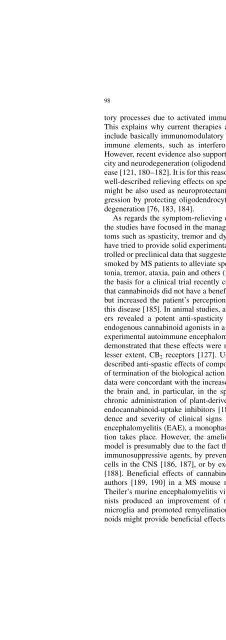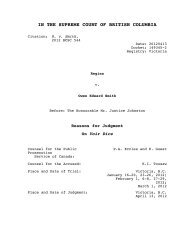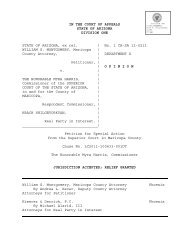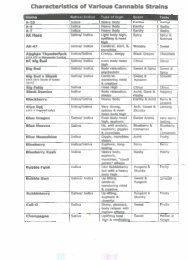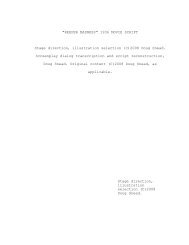3. Umbruch 4.4..2005 - Online Pot
3. Umbruch 4.4..2005 - Online Pot
3. Umbruch 4.4..2005 - Online Pot
You also want an ePaper? Increase the reach of your titles
YUMPU automatically turns print PDFs into web optimized ePapers that Google loves.
98 J. Fernández-Ruiz et al.<br />
tory processes due to activated immune cells entering the CNS [119, 120].<br />
This explains why current therapies addressed to delay disease progression<br />
include basically immunomodulatory agents (i.e. substances targeted against<br />
immune elements, such as interferon, glatiramer or mitoxantrone [179]).<br />
However, recent evidence also supports the ultimate occurrence of excitotoxicity<br />
and neurodegeneration (oligodendrocyte death and axonal loss) in this disease<br />
[121, 180–182]. It is for this reason that cannabinoids, in addition to their<br />
well-described relieving effects on specific symptoms in MS [127–130, 183],<br />
might be also used as neuroprotectant molecules to delay/arrest disease progression<br />
by protecting oligodendrocytes from death and by reducing axonal<br />
degeneration [76, 183, 184].<br />
As regards the symptom-relieving effects of cannabinoids in MS, most of<br />
the studies have focused in the management of pain and motor-related symptoms<br />
such as spasticity, tremor and dystonia (for review see [76, 183]). They<br />
have tried to provide solid experimental support to previous anecdotal, uncontrolled<br />
or preclinical data that suggested a beneficial effect for marijuana when<br />
smoked by MS patients to alleviate specific symptoms such as spasticity, dystonia,<br />
tremor, ataxia, pain and others (for review see [76, 183]). This has been<br />
the basis for a clinical trial recently completed in the UK, which has proved<br />
that cannabinoids did not have a beneficial effect on spasticity in MS patients,<br />
but increased the patient’s perception of improvement for different signs of<br />
this disease [185]. In animal studies, a series of studies by Baker and coworkers<br />
revealed a potent anti-spasticity effect of plant-derived, synthetic and<br />
endogenous cannabinoid agonists in a mouse model of MS, chronic relapsing<br />
experimental autoimmune encephalomyelitis (CREAE) [127–130]. They also<br />
demonstrated that these effects were mediated by cannabinoid CB 1 and, to a<br />
lesser extent, CB 2 receptors [127]. Using this mouse model, they have also<br />
described anti-spastic effects of compounds that are able to inhibit the process<br />
of termination of the biological action of endocannabinoids [128–130]. These<br />
data were concordant with the increase in endocannabinoid levels recorded in<br />
the brain and, in particular, in the spinal cord of these animals [128]. The<br />
chronic administration of plant-derived cannabinoids [186, 187] or specific<br />
endocannabinoid-uptake inhibitors [188] may also reduce or delay the incidence<br />
and severity of clinical signs in rats with experimental autoimmune<br />
encephalomyelitis (EAE), a monophasic model of MS where only inflammation<br />
takes place. However, the amelioration of experimental MS in this rat<br />
model is presumably due to the fact that cannabinoid agonists acted either as<br />
immunosuppressive agents, by preventing the accumulation of inflammatory<br />
cells in the CNS [186, 187], or by exerting a direct anti-inflammatory effect<br />
[188]. Beneficial effects of cannabinoids have been also reported by other<br />
authors [189, 190] in a MS mouse model generated by infection with the<br />
Theiler’s murine encephalomyelitis virus. In these animals, cannabinoid agonists<br />
produced an improvement of motor function, and reduced activated<br />
microglia and promoted remyelination in the spinal cord [189], so cannabinoids<br />
might provide beneficial effects in MS that would go beyond symptom


